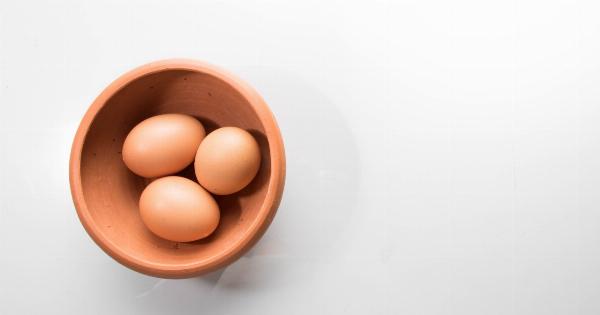Eggs are a staple in most kitchens, whether you use them for baking, cooking, or simply enjoying a delicious breakfast.
But have you ever wondered if the eggs in your fridge are still fresh? It can be challenging to tell just by looking at them, but don’t worry, we’ve got you covered. In this article, we will discuss some simple tricks to determine if eggs are fresh or stale. So let’s get cracking!.
1. The Water Test
One of the most common methods to check the freshness of eggs is the water test. Fill a bowl with cold water and gently place the egg into it.
Fresh Eggs: A fresh egg will sink to the bottom and lay flat horizontally on its side.
Stale Eggs: If the egg stands upright at the bottom, it is still safe to eat but not as fresh. However, if the egg floats on the surface, it is definitely stale and should be discarded.
2. Candle Test
The candle test is an old-fashioned way to determine if an egg is fresh or not. You will need a dark room and a strong source of light such as a candle or a flashlight.
Fresh Eggs: Hold the egg against the light source and look for a clear and distinct shadow of the yolk surrounded by a larger, translucent egg white. This indicates that the egg is fresh.
Stale Eggs: If you notice a hazy or blurry shadow, it means the egg is not as fresh. The more blurred the shadow appears, the staler the egg is.
3. Sniff Test
A quick sniff can also help you determine the freshness of an egg. However, be cautious while performing this test as a rotten egg can have an unpleasant smell.
Fresh Eggs: Fresh eggs usually have a neutral odor or a slightly eggy smell.
Stale Eggs: If you detect a strong, sulfur-like smell, it is an indication that the egg is no longer fresh and should not be consumed.
4. Shake Test
The shake test is another simple technique that can give you an idea about the freshness of an egg.
Fresh Eggs: When you shake a fresh egg gently, you will not feel or hear much movement inside the shell.
Stale Eggs: If you hear a sloshing sound or feel a lot of movement inside the shell, it means the egg has aged and is no longer fresh.
5. Visual Inspection
Although appearance alone cannot confirm the freshness of an egg, it can still provide some clues.
Fresh Eggs: Fresh eggs have a clean and smooth shell without any cracks or blemishes.
Stale Eggs: Cracked or discolored shells indicate that the egg is old and not as fresh.
6. Date Stamped on the Carton
A simple way to check the freshness of eggs is by referring to the date stamped on the carton.
Fresh Eggs: If the date on the carton indicates that the eggs were packed within the last week, they are likely fresh.
Stale Eggs: Eggs packed more than a month ago should be considered stale and are best avoided.
7. Quality and Consistency of the Egg White and Yolk
When you crack open an egg, pay attention to the color, texture, and overall appearance of the egg white and yolk.
Fresh Eggs: The egg white of a fresh egg should be clear and slightly thick, while the yolk should be rounded and have a bright yellow or orange color.
Stale Eggs: The egg white of a stale egg will become more liquid and spread out, while the yolk may appear flatter and pale.
8. Cooking Test
If you are still unsure about the freshness of an egg, you can always crack it open and give it a cooking test.
Fresh Eggs: A fresh egg will have a compact and well-defined white, and the yolk will be tall and centered.
Stale Eggs: The whites of stale eggs will spread out more, and the yolk may break easily or appear flattened.
9. Sourcing from Trusted Farms
One way to ensure the freshness of your eggs is to source them from trusted farms or local suppliers.
Fresh Eggs: Eggs obtained from reliable sources are more likely to be fresh and free from any contamination.
Stale Eggs: Buying eggs from unknown or suspicious sources increases the risk of obtaining stale or low-quality eggs.
10. Store Eggs Properly
The way you store your eggs can significantly impact their freshness and shelf life.
Fresh Eggs: Store eggs in their original carton on a shelf inside the refrigerator to maintain freshness.
Stale Eggs: Leaving eggs at room temperature or in a warm environment can accelerate spoilage and make them go stale more quickly.
By employing these tricks and techniques, you can easily determine if your eggs are fresh or stale. Remember, consuming fresh eggs not only ensures better taste and quality but also reduces the risk of foodborne illnesses. Happy egg checking!.



























